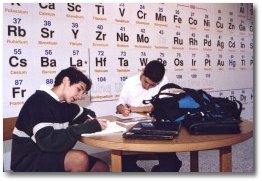Course
Offerings | Obtain
Adobe� viewer if needed
 The
science curriculum at St. Mark’s is an integrated, intensive laboratory oriented
program. Skills in critical thinking, reading, and drawing conclusions are drawn on from
other disciplines, utilized and extended. A wonderful facility complements the program
formulated below. Students make regular visits to the three-climate greenhouse, the
aviary, the planetarium and the observatory.
The
science curriculum at St. Mark’s is an integrated, intensive laboratory oriented
program. Skills in critical thinking, reading, and drawing conclusions are drawn on from
other disciplines, utilized and extended. A wonderful facility complements the program
formulated below. Students make regular visits to the three-climate greenhouse, the
aviary, the planetarium and the observatory.
The Lower School Science curriculum
provides the boys with the foundations for observing, communicating, measuring, comparing,
describing, classifying, predicting, collecting data and interpreting data. It is built to
foster curiosity, inventiveness, persistence, and enthusiasm. We want the boys to learn by
doing and reflecting. We use materials from a variety of programs to explore the life,
earth and space, and physical sciences. In first grade, we look at physical objects and
their properties; life cycles, habitats and the classification of plants and animals; the
sun and its effect on earth; and rocks, volcanoes, and earthquakes. Our second-grade
curriculum covers interactions and systems; air, water, and ground pollution; and animals
and endangered species. In third grade we formally discuss the use of scientific method.
We study light, sound, simple machines, the senses, nutrition and the digestive system,
invertebrates, vertebrates, the skeletal system, and conservation of earth’s
resources. Our fourth-grade curriculum covers an in-depth look at planet earth from its
core to the crust. We work with the basic features of matter and motion. In the life
science area, fourth graders study the respiratory, circulatory and nervous systems of the
human body. Fourth graders also learn basic laboratory techniques. In the Lower School, at
several grade levels, we use our planetarium as a primary tool in our study of astronomy.
The Middle School Science curriculum is a
series of laboratory-oriented disciplines which attempts to bring students and science
together in such a manner that each student will gain knowledge and a sense of confidence
about his environment. He will be able to analyze unfamiliar situations, consider
alternatives, and then decide on a course of action. In this way, students will ultimately
learn on their own initiative and develop an active interest in the learning process.
There is a balance between the physical and biological sciences, and between the
descriptive and more quantitative aspects of science. The Middle School science courses
described are required at the indicated grade levels.
The Upper School Science curriculum offers
a program of studies by which students will gain a basic knowledge of modern scientific
principles and ideas, and an understanding of the methods and significance of science in
contemporary society. There is a three-year laboratory science graduation requirement, and
all students must take biology. Students are, of course, encouraged to continue their
study of science beyond the three-year requirement. A variety of courses in biology,
chemistry, physics, astronomy, geology, and DNA science comprise the basic science
curriculum. Students who have the full complement of basic courses may qualify for
advanced placement courses in biology, chemistry, and physics. There are some other
courses which will appeal to students according to the individual descriptions below.
There are special activities sponsored by the science department which include JETS
competitions, the Astronomy Club, Model Airplane Club, Rocket Club, Garden Club and other
special project clubs.